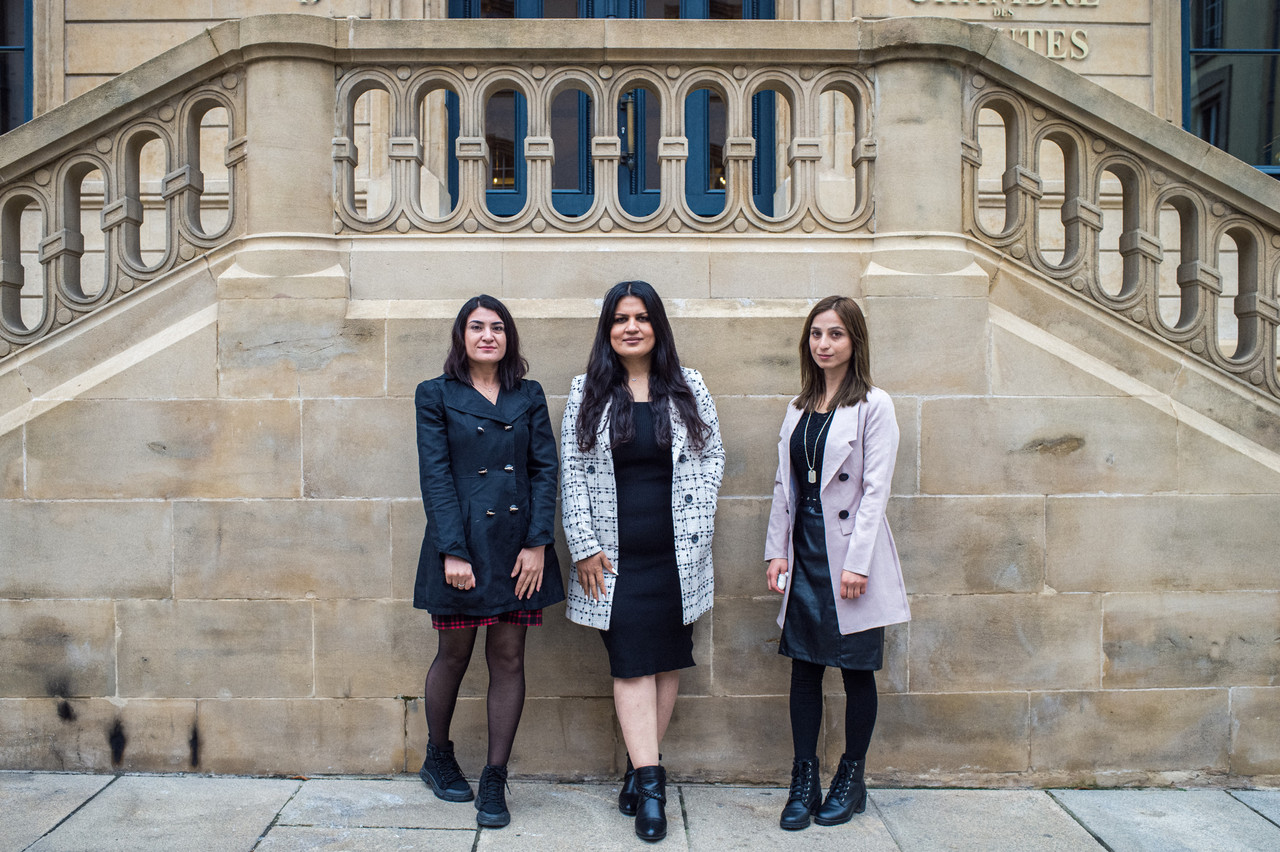The Islamic State (Isis) on 3 August 2014 began killing around 5,000 Yazidis during their offensive in northern Iraq and in the following weeks forced thousands of women into sexual slavery. Approximately 200,000 people remain internally displaced, most living in poverty without access to clean water or other basic amenities.
“We are here to ask the people of Luxembourg to recognise the Yazidi genocide so that this genocide will not be repeated against the Yazidi or any other religious minority,” said Hala Safil, a survivor and representative of the Yazidi Survivor Network, speaking through a translator.
The network has been working with Yazda, a non-profit that advocates on behalf of religious and ethnic minority groups. “It’s very important for us to be in Luxembourg, or any country, to raise our voice,” Safil said together with fellow survivor Salwa Saedo.
Safil and Saedo in advance had requested not to be asked about their ordeal. Safil in an interview with last year said she was saved from Isis in 2017 but doesn’t know what happened to her parents and three brothers.
Survivors’ law
A UN investigative team (Unitad) in May this year concluded that the Islamic State committed genocide against the Yazidi. The team said thousands were killed and thousands more enslaved, “with women and children abducted from their families and subjected to the most brutal abuses, including serial rape and other forms of unendurable sexual violence.”
Iraq’s parliament in March 2021 recognised the Yazidi genocide, requiring the government to pay compensation. But little has changed for the survivors. “They haven’t started implementing the law,” said Saedo. “What is the benefit of this law if it’s only words on paper?”
The adoption of the law took one and a half years, Safil said. The survivors network helped lobby lawmakers during this time. “If the process of adoption took this long, who knows when it will be implemented?”
We wish for justice for our community.
The passing of the law has also meant that international entities and organisations think their help is less needed. “Many agencies thought that the government is supporting us, that we are on the safe side, which isn’t true,” said Safil. NGOs have been withdrawing from Iraq, she said, despite precarious living conditions for displaced people.
Tent camps in the north of Iraq are ill-equipped for the cold of winter and the summer heat. A fire tore through the Sharya displacement camp in June this year, leaving 1,400 people homeless and adding new trauma for the survivors of the genocide.
“Authorities promised change and that the situation would improve for those affected by the fire,” the women said, but apart from moving victims of the fire to another displacement camp, nothing has happened.
Prosecuting Isis fighters
Isis survivor Nadia Murad in 2018 won the Nobel Peace Prize jointly with Denis Mukwege for their efforts to end the use of sexual violence as a weapon of war and armed conflict. Murad and other Yazidi women are represented by human rights lawyer Amal Clooney, who in 2019 addressed the UN Security Council on prosecuting Isis for their crimes.
Despite the high-profile advocates, the fight is slow and arduous.
“We would wish for the Luxembourg government to push the Iraqi government to have trials against Isis fighters. They committed crimes against us and we want these trials to be held under international standards,” Saedo said.
A German court in July this year convicted a former Isis member for aiding and abetting crimes against humanity for the enslavement of two Yazidi women. The Belgian, Dutch and French parliaments have adopted motions to officially recognise the crimes committed against the Yazidis as genocide along with around a dozen governments worldwide.
Safil and Saedo hope that Luxembourg will follow suit. During their stay in Luxembourg they are scheduled to meet with the president of Luxembourg’s Chamber of Deputies, Fernand Etgen (DP).
The group also hope to find an ally in Grand Duchess Maria Teresa. The grand duchess in 2019 hosted the Stand Speak Rise Up summit, a conference to combat the use of rape as a weapon of war and support victims, which also featured a keynote address by Mukwege.
UN Human Rights council
The group travelled with Ryan D’Souza, curator of a virtual reality experience around the genocide called “Nobody’s Listening”, which aims to make palpable the atrocities committed. The VR exhibition was part of the advocacy work used in Iraq to get the survivors bill passed.
With Luxembourg joining the UN Human Rights Council in January next year for a three-year mandate, the advocates also hope that the grand duchy will push the issue at wider level, meeting with foreign affairs minister Jean Asselborn (LSAP) to speak about their experiences and hopes from the international community.
“We need to discuss in depth what we can do together,” said Haider Elias, president of Yazda. “Luxembourg has been interested in minorities and helping victims,” he said. “This would be a good opportunity for Luxembourg to be an advocate.”
The grand duchy was a temporary member of the UN Security Council in 2014, when the genocide began. “If Luxembourg could organise an event or a meeting or even a commemoration event on 3 August during the three years…,” D’Souza said. He is also looking for ways to make the VR experience accessible to more people in Luxembourg.
“We wish for justice for our community and for ourselves,” said Safil, adding that support from the international community, including Luxembourg, “helps us find the justice we are looking for.”

